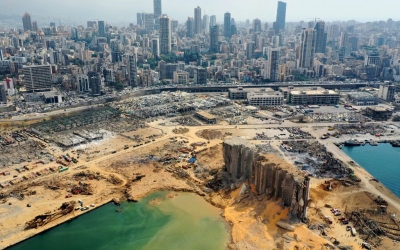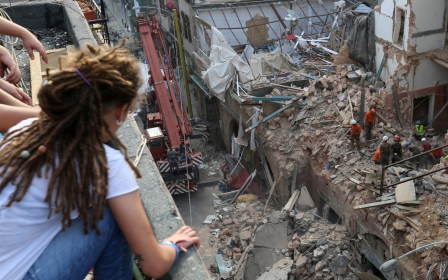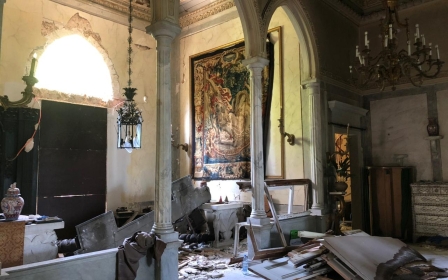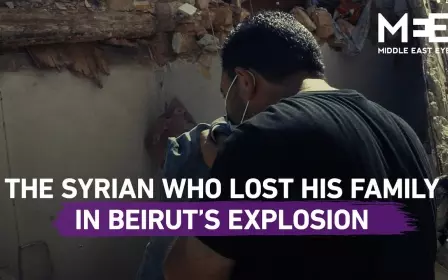Pain and poverty in Beirut one month on from fateful explosion
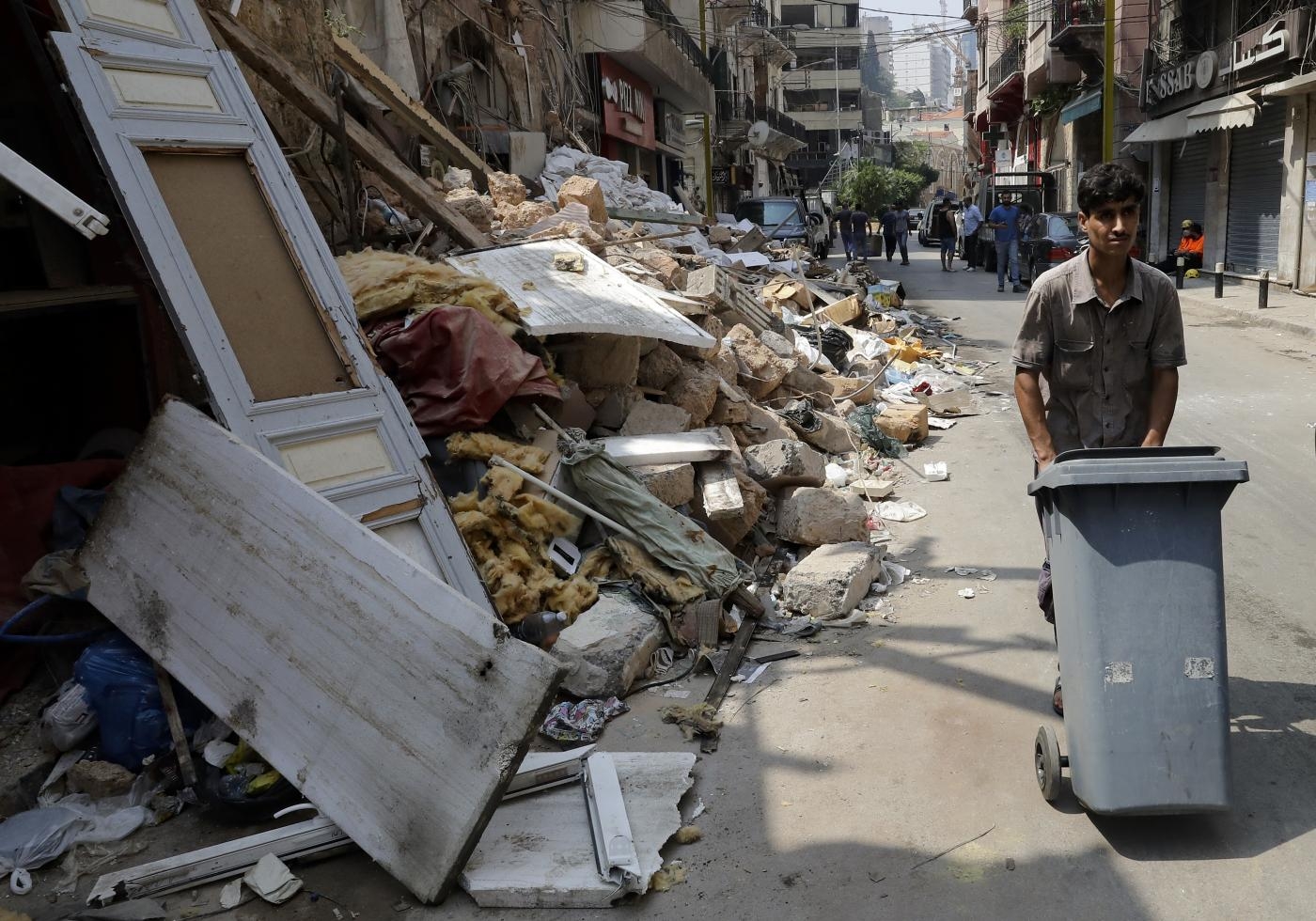
Abdel-Qader Ballouso woke up on 4 August thinking about what to get his son for his 12th birthday. He wanted to make it up to Ibrahim and his three other children for not celebrating Eid al-Adha several days earlier.
Rent for their apartment in the eastern Beirut district of Sin El-Fil had not been paid for two months and the March-May nationwide lockdown to combat the coronavirus had robbed the family of income, eating away at luxuries such as Eid celebrations.
Abdel-Qader did not have the heart to let his son down on his birthday, though.
"I will bring you a cake and new pair of shoes," he promised before heading to work at a blacksmith's workshop in the working class Beirut district of Karantina.
New MEE newsletter: Jerusalem Dispatch
Sign up to get the latest insights and analysis on Israel-Palestine, alongside Turkey Unpacked and other MEE newsletters
Minutes after 6pm, he finished work. As he was walking away from his workplace, one of the strongest non-nuclear explosions ever recorded threw Abdel-Qader to the ground, injuring his back.
Within two hours, the father of four was dead. He was just 46.
Abdel-Qader was among at least 190 people killed and over 6,500 injured when 2,750 tons of ammonium nitrate stored at Beirut's port, some 2km away from Karantina, ignited. He was also among at least 43 Syrians who reportedly lost their lives in the blast and whose stories went unnoticed in the media.
Like many of the 1.5 million Syrian refugees living in Lebanon, Abdel-Qadar and his family lived precariously, without legal documents or housing security.
Now his wife, Fatmeh Abu Mghara, 34, is forced to provide for their four children on her own, despite never having worked.
She has received support from individuals and organisations in order to cover the basic needs of the family in the immediate term.
She has also received money for rent for August from local charity Ajialouna and for September from an emergency crowd-funding initiative created to help victims of the explosion.
"Covering rent is one of the most important things; it is as important as medical care and as important as food and milk," said Seba Ali, an assistant professor at the Lebanese American University who organised the fundraising appeal online, raising nearly US$18,000 thus far, $8,000 more than the initial target.
Dignified support
Many organisations are providing food baskets to families affected by the blast, but some find it more dignified to provide cash assistance as part of their response plan.
"What if we give them a food basket with milk and their children are lactose intolerant?" asked Yasmin Kayali, co-founder of Basmeh & Zeitooneh, which has provided around 200 affected families with LL600,000, which used to be worth US$400 before the devaluation of the Lebanese currency caused by the country's economic meltdown, and is currently worth between $76 and $85.
'We now search for aid organisations that would give us canned food... we've never done that before'
- Khadija Hassan
"There are essentials that only families are able to identify, and we must allow them the dignity and space to choose what they need," said Kayali.
Basmeh & Zeitooneh's target for the first three-month phase is to support 5,000 families with a package consisting of cash assistance alongside food and hygiene baskets. The organisation has already secured more than 50 percent of the donations.
Meanwhile, the Lebanese Red Cross is finalising its plan to provide cash assistance to 10,000 affected families per month for between three and six months, secretary general of the Lebanese Red Cross, George Kettaneh, told MEE.
Many families interviewed by MEE said they preferred cash assistance as they no longer have money.
The Beirut explosion is the latest of a series of shocks that pushed more than half of Lebanon's population into poverty by May 2020, according to UN and World Bank estimates.
A deteriorating economic and financial situation since September 2019 led to the devaluation of the Lebanese currency, which lost up to 80% of its value in less than a year. This plunge of the Lebanese lira and the ensuing economic downturn were followed by the lockdown and coronavirus-related restrictions. As a result, thousands of businesses either scaled down their operations or closed permanently, leaving tens of thousands of people without an income.
Loss of income
In addition, the Beirut explosion damaged more than 15,000 establishments, nearly 50 percent of all the capital's establishments, the majority of which are in the wholesale, retail and hospitality sectors. This particularly had an impact on those vulnerable people who have lost their income, while their homes sustained serious damage. A report released by the government assessed that 50,000 houses, nine major hospitals and 178 schools were damaged in the explosion.
Three Lebanese sisters working in three different shopping malls in Beirut lost their jobs after the explosion, at a time when they needed their incomes the most as the pressure of the blast knocked down doors and shattered windows at their homes in the poor district of Khandaq al-Ghameeq, around 3km away from Beirut port.
"We now go search for aid organisations that would give us canned food... we've never done that before," said Khadija Hassan, one of the three sisters, who is divorced and is the only financial provider for her two teenage children.
In a report released on Friday, Oxfam warned that tens of thousands of people are unable to rebuild their homes, as prices for basic building material have rocketed due to inflation.
The charity said a front door can now cost up to two months' pay for a minimum wage worker, while the cost of a single square metre of glass to replace a broken window has soared from $16 before the explosion to $500.
"We no longer bring vegetables and fruits home," said Umm Mohamad, a 46-year-old Lebanese woman whose husband works as a six-wheel driver transporting containers with imported goods from Beirut port to customers in the capital and elsewhere in Lebanon.
Her husband's income halved due to a 40 percent retreat in imported goods by March 2020 compared with a year earlier, an outcome that was apparently the result of the shortage of foreign currency and the devaluation of the Lebanese lira. Meanwhile, her son lost his job at a restaurant during the coronavirus lockdown, leaving the family of six with a monthly income that has become worth around only $86.
Lebanon's minimum wage is LL675,000 per month, which used to be worth $450 per month before the devaluation of the lira, but is now worth between $86 and $96.
In Karantina, Syrian worker Abu Mahmoud, 34, whose six-year-old daughter was injured in the blast, has been seeking - without success - support to fix damage caused by the explosion to his tiny, dark ground-floor flat.
His unstable income as a porter of imported goods at the Port of Beirut is no longer enough to buy his family's basic needs, and there is no way he can afford to spend money on his damaged home.
"We used to work five days a week and that dropped to three days a week during the coronavirus lockdown," said Abu Mahmoud, who has returned to work at container terminal 14 at the port, which resumed operations around a week after the explosion.
Ali, 41 years old and a Syrian father of four, is Abu Mahmoud's neighbour and also works as a porter at the port.
One month ago, both Ali and Abu Mahmoud were asked not to go to work on 4 August due to the drop in imports. Their terribly unfortunate economic situation saved their lives.
Middle East Eye delivers independent and unrivalled coverage and analysis of the Middle East, North Africa and beyond. To learn more about republishing this content and the associated fees, please fill out this form. More about MEE can be found here.


